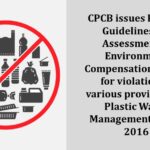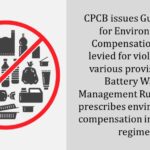In the case of Westend Green Farms Society Vs. Union of India and Ors., the National Green Tribunal, considering the adverse impact on the environment and public health due to violation of environment norms, had, through an Order dated 19th September 2019, directed the Central Pollution Control Board (“CPCB”) to lay down guidelines for the individual establishments or for the area/cluster Restaurants/ Hotels/ Motels/ Banquets etc with coercive measures in case of violation and also a monitoring mechanism.
Accordingly, the CPCB has now issued Guidelines for the Control of Pollution and Enforcement of Environment Protection Norms at Individual Establishments and the Area/ Cluster of Restaurants/ Hotels/ Motels/ Banquets etc.
These Guidelines focuses on major environmental issues related to marriage/ banquet halls and party venues creating water pollution, air pollution, solid waste problems, noise pollution and public inconveniences due to lack of adequate infrastructures like – vehicle parking space, proper waste collection and disposal systems, improper storage provisions etc.
To combat these environmental issues the Guidelines set out several measures some of which are as follows:
Installation of Effluent Treatment Plants (ETPs):
Roadside eateries/ restaurants having a sitting capacity of at least 36 seats must set up ETPs and the entire waste water generated from kitchen, laundry and domestic sewage must be treated in ETPs.
Also, the tested effluent water from the ETPs should meet the prescribed Environmental Standard.
Segregation of waste at source:
All hotels and restaurants shall, within one year from the date of notification of these rules and in partnership with the local body ensure segregation of waste at source as prescribed in these rules, facilitate collection of segregated waste in separate streams, handover recyclable material to either the authorised waste pickers or the authorised recyclers. The bio-degradable waste shall be processed, treated and disposed off through composting or bio-methanation within the premises as far as possible. The residual waste shall be given to the waste collectors or agency as directed by the local body.
Other measures covered by the guidelines include energy conservation measures, gensets and approved fuels, consent to establish and consent to operate the units, solid waste management measures, noise pollution, infrastructural requirements such as parking facilities, traffic movements, fire safety.
Source: Central Pollution Control Board




